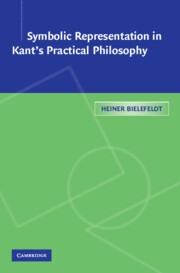Book contents
- Frontmatter
- Contents
- Citations and Translations
- Acknowledgments
- I INTRODUCTION
- II KANT'S SOCRATIC ENLIGHTENMENT
- III THE LAW OF FREEDOM
- IV HOW TO FIND ORIENTATION IN MORAL PRACTICE
- V THE ORDER OF RIGHTS AS A SYMBOL OF HUMAN DIGNITY
- VI TRACES OF PURPOSIVENESS IN NATURE AND HISTORY
- VII SYMBOLISM IN THE PHILOSOPHY OF RELIGION
- VIII CONCLUSION
- Bibliography
- Index
II - KANT'S SOCRATIC ENLIGHTENMENT
Published online by Cambridge University Press: 12 July 2009
- Frontmatter
- Contents
- Citations and Translations
- Acknowledgments
- I INTRODUCTION
- II KANT'S SOCRATIC ENLIGHTENMENT
- III THE LAW OF FREEDOM
- IV HOW TO FIND ORIENTATION IN MORAL PRACTICE
- V THE ORDER OF RIGHTS AS A SYMBOL OF HUMAN DIGNITY
- VI TRACES OF PURPOSIVENESS IN NATURE AND HISTORY
- VII SYMBOLISM IN THE PHILOSOPHY OF RELIGION
- VIII CONCLUSION
- Bibliography
- Index
Summary
Leaving the State of Tutelage
“Enlightenment is the human being's emergence from his self-incurred minority.” This famous opening of Kant's Answer to the Question What is Enlightenment? provides a first clue to understanding Kant's practical philosophy in general. The German term Unmündigkeit has been translated in English Kant editions as “immaturity,” “tutelage,” or “minority.” Unmündigkeit has a moral or legal meaning: It refers to a person who, like a minor, lacks full moral or legal responsibility. “Unmündigkeit,” Kant defines, “is inability to make use of one's own understanding without direction from another.” At the same time, however, Kant assumes that the person is already responsible for this state of tutelage, a state which, he says, is “selbstverschuldet.” The English translation as “self-incurred” obscures the strong moral and legal connotation of “selbstverschuldet,” a term that includes the component of guilt [Schuld]. Hence, what Kant wants to point out is that people are responsible for their not being fully responsible, which is certainly a paradox.
Assuming that this paradox is not tantamount to an outright logical contradiction, we had better understand Unmündigkeit as a relative (rather than absolute) situation of tutelage or minority. Kant indeed emphasizes that Unmündigkeit is selbstverschuldet only “when its cause lies not in lack of understanding but in lack of resolution and courage to use it without direction from another.”
- Type
- Chapter
- Information
- Symbolic Representation in Kant's Practical Philosophy , pp. 14 - 39Publisher: Cambridge University PressPrint publication year: 2003



